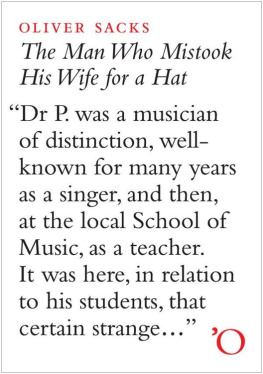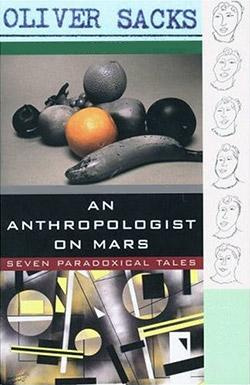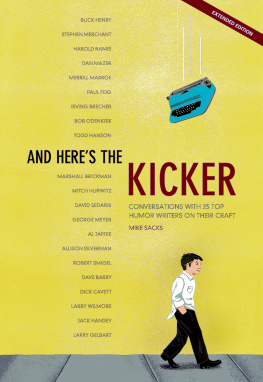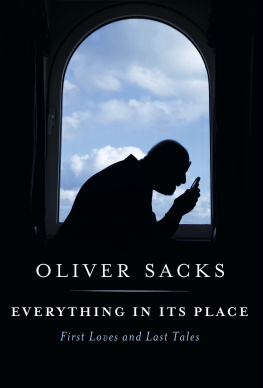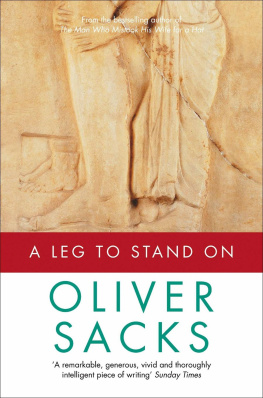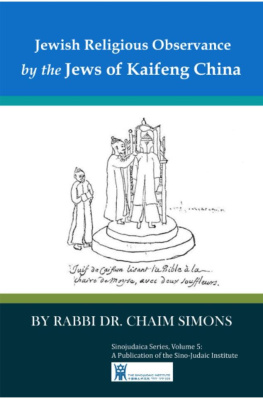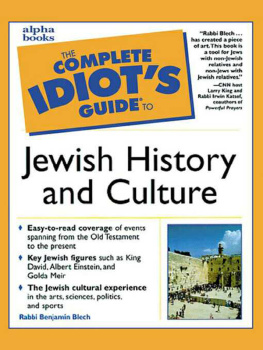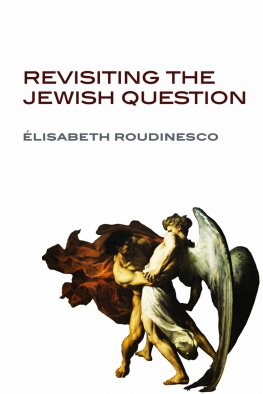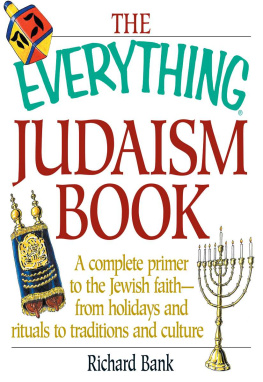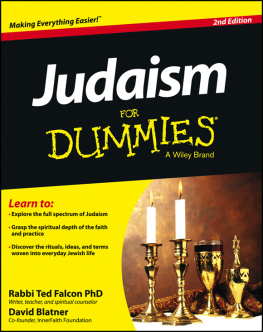
Also by Jonathan Sacks
Celebrating Life
Morals and Markets
The Politics of Hope
Community of Faith
Faith in the Future
Will We Have Jewish Grandchildren?
One People?
Crisis and Covenant
The Persistence of Faith
Orthodoxy Confronts Modernity
(editor)
Arguments for the Sake of Heaven
Tradition in an Untraditional Age
Tradition and Transition
(editor)
Torah Studies
A Letter in the Scroll
Understanding
Our Jewish Identity
and Exploring the Legacy
of the Worlds Oldest Religion
Rabbi Jonathan Sacks


THE FREE PRESS
A Division of Simon & Schuster Inc.
1230 Avenue of the Americas
New York, NY 10020
www.SimonandSchuster.com
Visit us on the World Wide Web:
http://www.SimonSays.com
Copyright 2000 by Jonathan Sacks
All rights reserved,
including the right of reproduction
in whole or in part in any form.
THE FREE PRESS and colophon are trademarks
of Simon & Schuster Inc.
Designed by Deirdre C. Amthor
ISBN 0-7432-1496-X
eISBN-13: 978-0-7432-1496-4
ISBN-13: 978-0-7432-0108-7
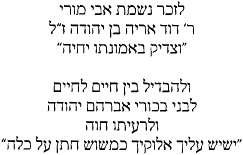
To the memory of my late father, Louis David Sacks
And to our son Joshua and daughter-in-law Eve:
Our continuity
Contents
Preface
T ODAY THROUGHOUT THE D IASPORA one Jew in two is either marrying out, or not marrying, or in some other way deciding not to create a Jewish home, have Jewish children, and continue the Jewish story.
At such momentsrare in our historywe, or our children, face the question, Who am I and why should I remain a Jew? That question can never be answered in the abstract. It is intensely personal and demands a personal reply.
This is my personal reply. None of us can answer this question for anyone else. But it sometimes helps to know how other people have thought about it, which is why I have decided to publish this book as an open letter to the next generation.
Writing it turned out to be, for me, a journey of discovery. Time and again as I asked, not What? but Why?, to my surprise I found Judaism disclosing itself to me in a way I had not seen before. So at the heart of the story I have to tell is my own theology of Judaism, something I have never previously written.
The more I penetrated into the mystery of Jewish survival, the more clearly I saw the originality, the distinctiveness, the sheer sanity of its vision of the world and of mankind, and how little it is understood by ourselves and others even now. We need to go back to our texts. Crisis is creative. It allows usas more settled times do notto encounter an ancient heritage afresh.
I presented the first draft of this book to our son Joshua and daughter-in-law Eve on the day of their wedding. It is my gift to them. It is also a tribute to my late father, of blessed memory, and to what I learned from him. This is my yizkor, my prayer to his memory. For when Jews remember, they do so for the future, the place where, if we are faithful to it, the past never dies.
Rosh Chodesh Elul 5760
A Letter in the Scroll
Prologue
A GROUP OF J EWISH UNIVERSITY STUDENTS had come to see me. They were planning their course for the next year and they wondered whether I could suggest a theme.
I thought for a moment and then I suggested this: There are many Jews today doing interesting and significant things. There are artists and academics, judges and doctors, politicians and heads of voluntary organizations, writers and journalists. Their work must raise, in a myriad ways, important questions about what to do and how to live. Write to them and ask them whether they would give you a brief personal statement about what being a Jew means to them and how it makes a difference to their lives. You will then have a series of texts that you will be able to compare with some of the classic statements of our tradition. You will be able to listen to the voices of the past and those of the present, and between them you can construct a fascinating series of discussions on what being a Jew might mean to you.
The students were excited by the suggestion, and during the weeks that followed we exchanged ideas about whom to ask and how to construct the questions. Months passed, and hearing no more about the project I inquired about its progress. They told me that they had sent out almost two hundred letters, and received only six replies. These were three of them. The first came from a famous and distinguished Jewish academic. He wrote:
I am quite incapable of writing even a short passage on what being Jewish means to me. All that I think is that I am a Jew, in exactly the sense in which I have two legs, arms, eyes etc. It is just an attribute, which I take for granted as belonging to me, part of the minimum description of me as a person. I am neither proud of it nor embarrassed by it. I am just a Jew and it never occurred to me that I could be anything else. The question Why be Jewish? is something that I cannot answer any more than Why be alive? or Why be two-legged?
The second came from a noted Jewish writer:
Jewishness is a source of comfort and reassurance to me and gives me a sense of belonging to a proud and ancient community, but all that is entirely due to the fact that I was brought up as a Jew. I have no doubt that I would have felt the same had I been brought up as a Catholic, Protestant, Muslim, Buddhist or Hottentot.
The third came from an Israeli, prominent in public life in Israel and the Diaspora:
One of the most interesting definitions of Judaism that I know is something that I heard a number of years ago from a young Israeli boy. Judaism, he said, is a hereditary illness. You get it from your parents, and also pass it along to your children. And why call it an illness? I asked. Because not a small number of people have died from it, he answered.
The students felt let down, and to be honest, so did I. Here were three Jews, none of them hostile to Judaism or the Jewish people, two religiously committed and the third famous for his defense of some central Jewish values. Each had taken the trouble to write a message to the next generation. Yet the message itself was strangely ambivalent. For the first two, being Jewish was a mere accident of birth. For the third it was worse than an accident. It was an illness. The students felt, and I agreed, that there was nothing here on which a college course could be built.
So the next time I addressed a student group, I read them these responses. Then I asked them to listen to some other voices reflecting on Judaism and the Jewish people. I read to them these words by the great Russian novelist Leo Tolstoy:
The Jew is that sacred being who has brought down from heaven the everlasting fire, and has illumined with it the entire world. He is the religious source, spring and fountain out of which all the rest of the peoples have drawn their beliefs and their religions.
And these by the nineteenth-century American president John Adams:
I will insist that the Hebrews have done more to civilize men than any other nation. If I were an atheist, and believed in blind eternal fate, I should still believe
Next page

